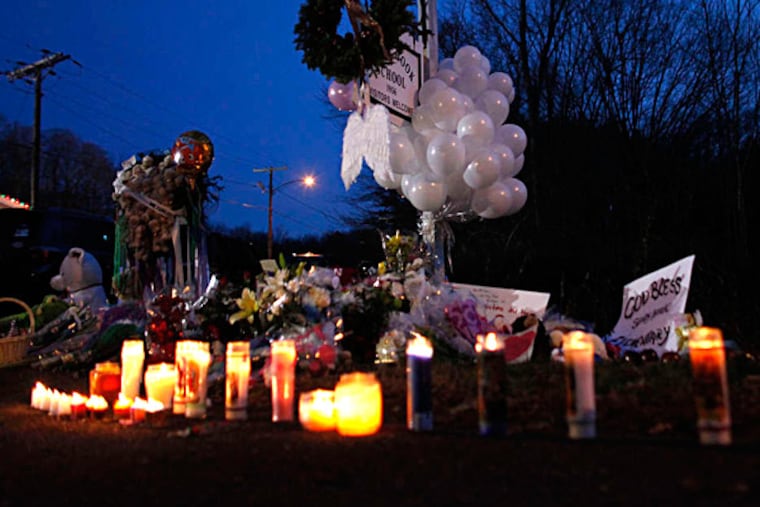Maybe now we can finally have real gun dialogue
Karen Rile teaches creative writing at the University of Pennsylvania I was hanging out with my kids at the local playground, filling buckets in the sandbox. "We're making sand cakes," I told the baby. "But don't eat them; they aren't real."

Karen Rile
teaches creative writing at the University of Pennsylvania
I was hanging out with my kids at the local playground, filling buckets in the sandbox. "We're making sand cakes," I told the baby. "But don't eat them; they aren't real."
Suddenly, my 3-year-old screamed in horror. "Mommy, those children have guns!"
I looked over to see a couple of boys chasing each other with plastic pistols. A third was pointing his revolver at us. Their moms looked up at that moment and laughed. For a second, I marveled at my daughter's child's-eye perspective, where anything was possible in this world, even kindergartners with pistols. Then, I pulled her into my lap and hugged her, explaining that those guns, just like her Fisher-Price kitchen set at home, were not real.
A few months later, the father of a boy we'd invited for a play date called and gave me the third degree. Would there be a seat belt for his son's car seat when I picked the kids up from Montessori? Would there be an adult around at all times? Was there a gun in the house? As I stammered my reassurances, I tried not to sound insulted. No parent had ever interrogated me like this. And, no, we did not own a gun. We also did not have heroin, nuclear weapons, or rabid monkeys in the house.
I grew up in a culture of indirectness, where it's better to collect information through sly observation than to risk putting anyone on the spot. It never occurred to me to bluntly grill another parent about the safety of his home, no more than I would have thought to ask those playground moms to stop their sons from pointing plastic pistols in my 3-year-old's face.
My reticence did not come solely from a congenital horror of awkward confrontations: I naively assumed that the other parents I met had similar values and habits to my own. In other words, I assumed that everyone lived according to the rules inside my own head. I'd never even seen a real gun, except on the hip of a police officer. Guns were in movies, or if you lived in Alaska and were worried about bears. Nobody I knew had one - right?
Well, wrong. In 2009, more than 40 percent of American households surveyed reported that they owned at least one firearm, whether for protection or sport. That's a lot of firepower, and, chances were, I knew many families who owned guns. I'd just never thought about it.
A few years later, my younger daughter, now in first grade, returned from a play date, upset and anxious. "Something bad happened at Laura's," she told me. The girls had been in their friend's bedroom playing Candy Land when Laura casually mentioned that her dad kept a big gun hidden in his closet. My daughter didn't believe her, so Laura took her into her parents' bedroom, got out her father's rifle, and hoisted it over her shoulder. At that moment, Laura's mother walked into the room. "We got in big trouble," my daughter reported, chin trembling. "Laura's mom was really, really mad."
I did not know how to digest this information. I assured my daughter that she had done nothing wrong; the adults of the house should not have left a gun in a place where children could reach it. And then I sat awhile and pondered: What was I supposed to do next?
I imagined the awful panic Laura's mother must have felt when she saw the children playing with her husband's rifle. I imagined the terrible argument between Laura's parents over where the gun had been stored. I felt their shame and distress as if it were my own. I wanted to reassure them. It's OK; please don't be upset; nothing bad happened; maybe the gun wasn't loaded (well, I hope not). I'm sure you'll keep it locked up from now on. We can all learn from this experience.
That was the imaginary conversation inside my head, as I sat on the kitchen floor, comforting my daughter, bracing myself for their inevitable phone call and the painful, necessary talk. But the call never came. I never heard from Laura's parents. My daughter was not invited over again, and if she had been, I'd have made up some excuse not to send her. It was easier for all of us to pretend the incident had never happened than to do the difficult, adult work of speaking to each other directly and respectfully.
These days, when I try to envision a gun in my hands, imagination fails. To me, guns are created for a single purpose: killing. They have no place in a house with children. But to others, including people whom I respect, guns are objects of pleasure and entitlement. Guns are for protecting children. They enjoy teaching their children how to shoot. Every time a friend reveals he has a gun, I feel like my shocked 3-year-old in the playground all those years ago. I can't quite wrap my mind around their position, nor they mine.
A few days ago, gun sales spiked, as they always do after a mass shooting, and just before Christmas. Everyone is now calling out for dialogue on gun control. This gives me hope. If we can get past the rants and the screeds, and the imaginary conversations on our kitchen floors, then maybe we can begin our difficult, adult work. I think we might be ready this time.